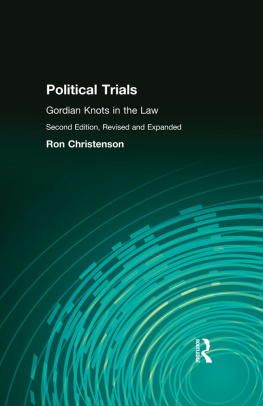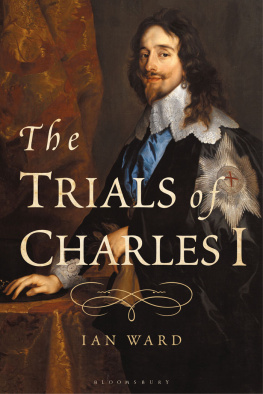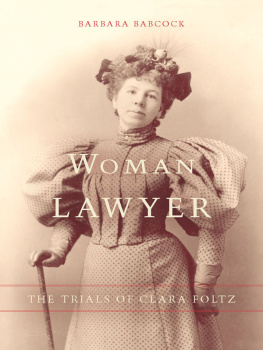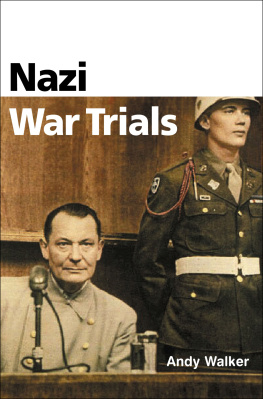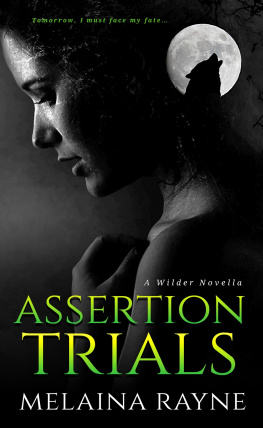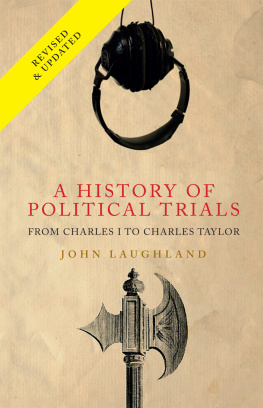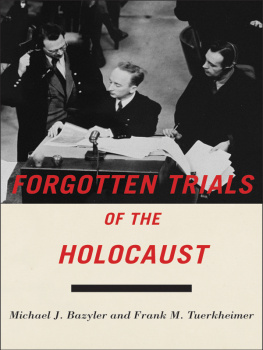POLITICAL TRIALS
Political Trials
Gordian Knots in the Law Second Edition, Revised and Expanded
Ron Christenson
With a New Preface by the Author
First published 1999 by Transaction Publishers
Published 2017 by Routledge
2 Park Square, Milton Park, Abingdon, Oxon OX14 4RN
711 Third Avenue, New York, NY 10017, USA
Routledge is an imprint of the Taylor & Francis Group, an informa business
Copyright 1999 by Taylor & Francis.
All rights reserved. No part of this book may be reprinted or reproduced or utilised in any form or by any electronic, mechanical, or other means, now known or hereafter invented, including photocopying and recording, or in any information storage or retrieval system, without permission in writing from the publishers.
Notice:
Product or corporate names may be trademarks or registered trademarks, and are used only for identification and explanation without intent to infringe.
Library of Congress Catalog Number: 98-27092
Library of Congress Cataloging-in-Publication Data
Christenson, Ron.
Political trials : Gordian knots in the law / Ron Christenson ; with a new preface by the author. 2nd ed., rev. and expanded.
p. cm.
Includes bibliographical references and index.
ISBN 0-7658-0473-5 (pbk. : alk. paper)
1. Trials (Political crimes and offenses). 2. Political crimes and offenses. 3. Trials (Political crimes and offenses)United States. 4. Political crimes and offensesUnited States. I. Title.
K543.P6C56 1998
345'.0231dc21
98-27092
CIP
ISBN 13: 978-0-7658-0473-0 (pbk)
For Kate, Abigail, Ian, Dietrich, Kimberly, and
In memory of Rolf
Contents
with Ralston H. Deffenbaugh, Jr.
Guide
The framework for this book is a 1983 article by the author, A Political Theory of Political Trials, reprinted by special permission of the Journal of Criminal Law and Criminology , by Northwestern University School of Law, Vol. 74, No. 2. Also, from The Trial of the Catonsville Nine , by Daniel Berrigan, 1970 by Daniel Berrigan, S.J., reprinted by permission of Beacon Press.
What is a political trial? Can a political trial strengthen the rule of law? How do certain trials reflect and change the nature of both politics and law? I have asked these and other similar questions of students in my jurisprudence class for over two decades. The resulting discussions have been stimulating, although we have never arrived at definitive answers. The questions matter more.
Since the mid-1980s when this book was written, a number of notable political trials have raised critical questions for society. Shocking public exposures about the Guildford 4 and Maguire 7 trials led to questions that shook the British criminal justice system, while in the United States the trials concerning the beating of Rodney King led up to the O. J. Simpson spectacle and a host questions parallel to what the British faced. Terrorists such as Paul Hill, found guilty of murdering an abortion doctor, and Timothy McVeigh, convicted of bombing the Oklahoma City federal building, raise the same questions as the case of the left-wing dissenter Karl Armstrong did in the 1970s. Finally, South Africas transition from an apartheid regime to democracy raises basic questions about whether a nation can not only remember but grant amnesty and achieve reconciliation. This edition will consider these cases.
Other cases, because of space, will not be considered here. The trials of John Demjanjuk, Paul Touvier, and Maurice Papon have raised the issues of the Holocaust and questions about collaboration; Oliver Norths trial caused us to ask about the issues of loyalty during the Cold War; the trials of Erich Honecker and Markus Wolf opened up similar Cold War questions in East Germany. These trials, while important, will not be considered in this second edition. Likewise, the war crimes tribunals at the Hague concerning genocide in the former Yugoslavia and the tribunals created to deal with Rwandan genocide, while raising some of the most fundamental questions, have not at the time of this writing completed enough work to be part of this second edition.
Nevertheless, a trial from fifty years ago will be examined. The trial of Norways Nobel Prize winning author, Knut Hamsun, presents a classic example of a nationalist accused of betraying his nation.
Four people must be thanked for their work on this second edition: Karen Stuppi of Transaction Publishers for overseeing the editorial tasks; Andrew Kay for his computer work; my daughter Abigail for her perseverance and the countless hours in putting the text right; and my wife Kathryn for her resolute devotion at all stages of the work.
Ron Christenson
This book began with a simple question raised by a student in my jurisprudence class: What is a political trial? My response was the generally accepted standard answer, that political trials are attempts by regimes to control opponents by using legal procedure for political ends. It was based on a book for which I have immense respect, Otto Kirchheimers Political Justice . But my response satisfied neither me nor my students. With the trials of the Chicago Eight, the Boston Five, the Catonsville Nine, and Dennis Banks and Russell Means fresh in our minds, and after having had Leonard Weinglass, William Kunstler, Russell Means, and later Fr. Daniel Berrigan on campus as guest lecturers, the standard response to the question seemed vastly oversimplified. More questions about law and politics are raised by certain trials than we can encompass by saying that they involve the attempt of those with power to swat their opponents.
In subsequent semesters of the jurisprudence class I invited my students to explore the problems raised in political trials by considering, along with the theories of law of H. L. A. Hart and Ronald Dworkin, such issues as are contained in Aeschylus Oresteia , the trials of Socrates, Jesus, John Lilburne, and the Nuremberg defendants, Robert Bolts play A Man for All Seasons , and Samuel Butlers satire of a trial in Erewhon . In each instance we asked ourselves: Is this a political trial? What is the difference between what is properly law and what is properly politics? What can the courts do when faced with a case which questions the legitimacy of the law itself? Is the fundamental difficulty that law and politics operate according to diametrically opposite premises: power is its own authority in politics, but the rule of law is legitimate only when might does not make right? Can the law be something more than an instrument of those who hold power whether direct power, hidden economic power, or subtle social influence? Finally, can we have political trials within the rule of law?
I wish I could recall who in my class asked the question in the first place. I would tell that student, now probably a decade after graduation, that I have a better response: nine chapters as elaboration. The laws delay is nothing compared to the academys.
In addition to my students who ask questions, I must thank those teachers of mine, such as Howard Lutz, Karl Meyer, Arthur L. Peterson, and Mulford Q. Sibley, who encouraged questions from students. Certain questions are put to human beings, Leo Tolstoy has taught us, not so much that they should answer them but that they should spend their lives wrestling with them.
I am fortunate to be teaching at a college which is a community of good will. Cheerful colleagues have provided an informal and running conversation about the questions raised by political trials. They include Howard Cohrt, William Dean, Richard Elvee, Tom Emmert, Robert Esbjornson, Marleen Flory, Will Freiert, Michael Haeuser, Norma Hervey, Douglas Huff, Conrad Hyers, Byron Nordstrom, Garrett Paul, David Wicklund, and especially Don Ostrom. Charles Walcott was a dependable driver and listener. I was given time and assistance to work on the project by a leave from Gustavus Adolphus College and a National Endowment for the Humanities Fellowship for College Teachers. The first version of this project was presented at the 1982 meeting of the Academy of Criminal Justice Sciences in Louisville, Kentucky, and received the Anderson Outstanding Paper Award. Versions of were presented at the 1983 ACJS meeting in San Antonio, Texas. I appreciate the comments of the critics, especially Otis Stephens and Philip Rhoades. I am grateful to several people for their dedicated service in editorial, typing and detail work: Dalia Buzin, Lisa Bushmann, Janine Genelin, Janice Handler, Diane Jensen, Joyce Johnson, Omo Kariko, Joan Kennedy, Julie Lloyd, Nancy Pautz, and especially Saralyn Kriesel. Melody Decker and the staff of the Clerks Office in the Federal District Court in St. Paul were helpful and patient while I spent a month in their office reading the Wounded Knee transcript.

